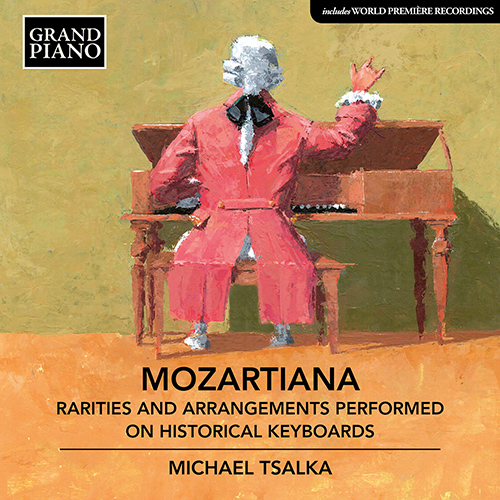
About this Release
“Mozartiana is a compilation of W.A. Mozart’s complete and incomplete compositions interpreted on two extremely rare historical instruments, the tangentenflügel and the pantalon. The project came about in early 2018 when my dear friend Pooya Radbon contacted me after restoring a Berner Tangentenflügel (late eighteenth century) and a Maucher Pantalon (c. 1780). He asked if I would consider making a recording on them, and our conversation centred on rare arrangements of Mozart’s incomplete works, such as Franz Beyer’s 1995 completion and piano arrangement of Mozart’s ballet-pantomime Pantalon und Colombine, K. 446-Fs (tracks 2-14), in which he played Harlequin during the carnival season of 1783. These scores demand from us as interpreters not only technical mastery and reverence for the stylistic practices of the past, but also an active imagination and bold interpretation. It is my conviction that Mozart would have been happy to listen these piano arrangements on two marvelous and original historic instruments, restored and revived almost 230 years after his death.” — Michael Tsalka
MOZART, WOLFGANG AMADEUS (1756–1791)
Mozartiana
Rarities and Arrangements Performed on Historical Keyboards
- Michael Tsalka, tangent piano
Keyboard arrangements of Mozart’s compositions, ranging from one of his earliest minuets to his tribute to J.S. Bach, reveal the variety and fecundity of his imagination, not least in the inspired collection made by the great pianist Edwin Fischer, and in the excerpts from the playful Londoner Skizzenbuch. They are performed on two original and newly restored instruments, the Tangentenflügel—a transitional keyboard instrument with a unique tone quality that sounds like a harpsichord endowed with dynamics—and the pantalon square piano. This is the first recording ever made of a historical pantalon.
This recording was made on a period instrument: Berner Tangentenflügel and Maucher Pantalon Square Piano from the Pooya Radbon Collection
Tracklist
|
1
Adagio in B Minor, K. 540 (1788) (00:08:07)
|
|
Musik zu einer Pantomime Pantalon und Colombine, K. 446 (completed, edited and arranged by F. Beyer for piano) (1783) (00:24:49 )
|
|
2
Overture (arr. from Symphony No. 11 in D Major, K. 84: I. Allegro) (00:03:17)
|
|
3
No. 1. Allegro: Pantalon und Colombine zanken sich (00:00:43)
|
|
4
No. 2. Maestoso: Der Dottore kommt (00:02:05)
|
|
5
No. 3. Allegro: Pierò kommt gelaufen. Pantalon, Pierò und Dottore liegen aufe der Erde (00:01:06)
|
|
6
No. 4. Poco Adagio: Dottore und Colombine steht unbeweglich (00:00:48)
|
|
7
No. 5. Andante molto: Pantalon und Pierò bringen den Tisch (00:00:50)
|
|
8
No. 6. Adagio: Colombine ist ganz traurig - Allegro: Arlequin guckt aus dem Kasten heraus (00:04:47)
|
|
9
No. 7. Allegro maestoso (00:01:05)
|
|
10
No. 8. Larghetto: Pierò geht auf und ab, sieht den Türken (00:01:31)
|
|
11
No. 9. Allegro (ma non troppo) - Presto (00:00:58)
|
|
12
No. 10. Maestoso (00:02:49)
|
|
13
No. 11. Allegro: Pierò fürchtet sich vor dem toten Arlequin - Marcia - Allegro (00:03:39)
|
|
14
No. 12. Finale (arr. from Presto in D Major, K. 120) (00:01:11)
|
|
15
Keyboard Piece in F Major, K. Anh. A6 (previously known as K. 33B) (1766) (00:01:02)
|
|
16
London Sketchbook, K. Anh. 109b: [Allegretto] in F Major, K. 15a (1765) (00:01:06)
|
|
17
London Sketchbook, K. Anh. 109b: [Andantino] in C Major, K. 15b (1765) (00:01:33)
|
|
18
London Sketchbook, K. Anh. 109b: [Contredanse] in F Major, K. 15h (1765) (00:00:50)
|
|
19
London Sketchbook, K. Anh. 109b: [Minore] in A Minor, K. 15k (1765) (00:01:09)
|
|
20
London Sketchbook, K. Anh. 109b: [Siciliano] in D Minor, K. 15u (1765) (00:01:31)
|
|
21
Minuet in G Major, K. 1 (arr. E. Fischer for piano as Mozartiana: I. 3 Menuette: No. 1) (1762) (00:02:14)
|
|
22
Keyboard Piece (Minuet) in F Major, K. 2 (arr. E. Fischer for tangent piano) (1762) (00:00:47)
|
|
23
Piece in D Major, K. Anh. H24, No. 18 (previously known as Minuet, K. 94) (arr. E. Fischer for piano as Mozartiana: I. 3 Menuette: No. 3) (1769) (00:01:18)
|
|
24
Fantasy in F Minor, K. 608 (arr. E. Fischer for piano as Mozartiana: II.) (1791) (00:11:51)
|
|
25
Andantino in E-Flat Major, K. 236 (Mozart's arr. of Non vi turbate from C.W. Gluck's Alceste, arr. E. Fischer for piano as Mozartiana: III.) () (00:01:09)
|
|
26
Contredanse in D Major, K. 534, "Das Donnerwetter" (arr. E. Fischer for piano as Mozartiana: IV.) (1788) (00:02:39)
|
|
27
Romance in A-Flat Major, K. Anh. 205/K. Anh. C27.04 (arr. E. Fischer for piano as Mozartiana: V.) () (00:05:04)
|
|
28
Variations on an Arietta from G. Sarti's I Finti Eredi, K. Anh. 289/K. Anh. C26.06 (arr. E. Fischer for piano as Mozartiana: VI.) () (00:07:57)
|
The Artist(s)
The Composer(s)
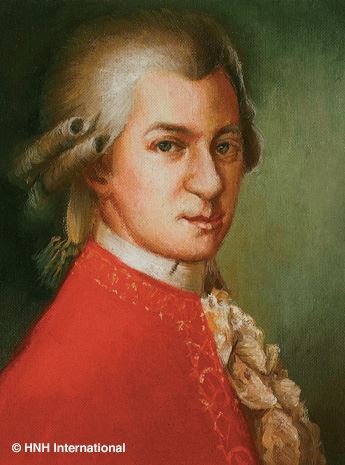 The youngest child and only surviving son of Leopold Mozart, Wolfgang Amadeus was born in Salzburg in 1756, the publication year of his father’s influential treatise on violin playing. He showed early precocity both as a keyboard player and violinist, and soon turned his hand to composition. His obvious gifts were developed, along with those of his elder sister, under his father’s tutelage, and the family, through the indulgence of their then patron, the Archbishop of Salzburg, was able to travel abroad—specifically between 1763 and 1766, to Paris and to London. A series of other journeys followed, with important operatic commissions in Italy between 1771 and 1773. The following period proved disappointing to both father and son as the young Mozart grew to manhood and was irked by the lack of opportunity and lack of appreciation for his gifts in Salzburg, where a new archbishop was less sympathetic. A visit to Munich, Mannheim and Paris in 1777 and 1778 brought no substantial offer of other employment and by early 1779 Mozart was reinstated in Salzburg, now as court organist. Early in 1781 he had a commissioned opera, Idomeneo, staged in Munich for the Elector of Bavaria, and dissatisfaction after being summoned to attend his patron the Archbishop in Vienna led to his dismissal. Mozart spent the last 10 years of his life in precarious independence in Vienna, his material situation not improved by a marriage imprudent for one in his circumstances. Initial success with German and then Italian opera and a series of subscription concerts were followed by financial difficulties. In 1791 things seemed to have taken a turn for the better, despite a lack of interest from the successor to the Emperor Joseph II, who had died in 1790. In late November, however, Mozart became seriously ill and died in the small hours of 5 December. Mozart’s compositions were catalogued in the 19th century by Köchel, and they are now generally distinguished by the K. numbering from this catalogue.
The youngest child and only surviving son of Leopold Mozart, Wolfgang Amadeus was born in Salzburg in 1756, the publication year of his father’s influential treatise on violin playing. He showed early precocity both as a keyboard player and violinist, and soon turned his hand to composition. His obvious gifts were developed, along with those of his elder sister, under his father’s tutelage, and the family, through the indulgence of their then patron, the Archbishop of Salzburg, was able to travel abroad—specifically between 1763 and 1766, to Paris and to London. A series of other journeys followed, with important operatic commissions in Italy between 1771 and 1773. The following period proved disappointing to both father and son as the young Mozart grew to manhood and was irked by the lack of opportunity and lack of appreciation for his gifts in Salzburg, where a new archbishop was less sympathetic. A visit to Munich, Mannheim and Paris in 1777 and 1778 brought no substantial offer of other employment and by early 1779 Mozart was reinstated in Salzburg, now as court organist. Early in 1781 he had a commissioned opera, Idomeneo, staged in Munich for the Elector of Bavaria, and dissatisfaction after being summoned to attend his patron the Archbishop in Vienna led to his dismissal. Mozart spent the last 10 years of his life in precarious independence in Vienna, his material situation not improved by a marriage imprudent for one in his circumstances. Initial success with German and then Italian opera and a series of subscription concerts were followed by financial difficulties. In 1791 things seemed to have taken a turn for the better, despite a lack of interest from the successor to the Emperor Joseph II, who had died in 1790. In late November, however, Mozart became seriously ill and died in the small hours of 5 December. Mozart’s compositions were catalogued in the 19th century by Köchel, and they are now generally distinguished by the K. numbering from this catalogue. Reviews
“Tsalka treats us to a most engaging pastiche” – Fanfare
“Michael Tsalka is a sensitive interpreter who knows exactly how to handle the two instruments, making sure that their respective qualities come fully to the fore.” – MusicWeb International
“Tsalka, playing the series of sparkling, spirited miniatures from the completed, edited and arranged version by German musicologist Franz Beyer (1922-2018), provides the listener with fine entertainment, giving the lively, uninhibited tangent piano carte blanche to evoke the exaggeration, coquettishness, pseudo-dramas, humour and, above all, the devil-may-care and flamboyant sauciness that are part and parcel of the Commedia dell’Arte tradition…” – Pamela Hickman’s Concert Critique Blog

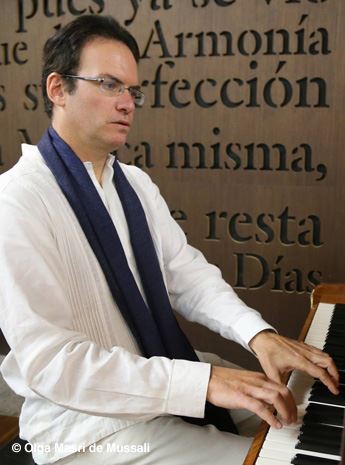
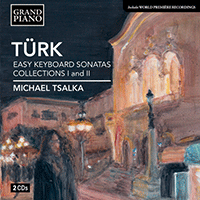
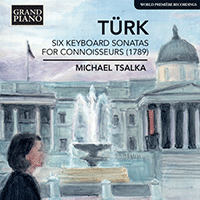
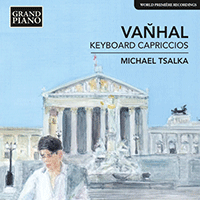
 Grand Piano has gained a reputation for producing high quality recordings of rare keyboard gems. Dedicated to the exploration of undiscovered piano repertoire, the label specialises in complete cycles of piano works by many lesser-known composers, whose output might otherwise have remained unknown and unrecorded.
Grand Piano has gained a reputation for producing high quality recordings of rare keyboard gems. Dedicated to the exploration of undiscovered piano repertoire, the label specialises in complete cycles of piano works by many lesser-known composers, whose output might otherwise have remained unknown and unrecorded.






